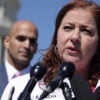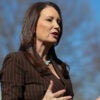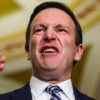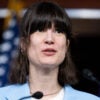When the Supreme Court ruled that the federal government could not ban books in order to protect incumbents from critical speech, MSNBC’s Keith Olbermann compared the decision to Dredd Scott, warning that after Citizens United v. Federal Election Commission:
It is almost literally true that any political science fiction nightmare you can now dream up, no matter whether you are conservative or liberal, it is now legal. Because the people who can make it legal, can now be entirely bought and sold, no actual citizens required in the campaign-fund-raising process.
The Daily Signal depends on the support of readers like you. Donate now
It has only been six months since the decision, but as Mother Jones reports today we can already see if Olbermann’s nightmare is coming true:
Just as predicted, campaign ads that would previously have been illegal are now airing in key midterm election races. But the players funding those ads aren’t the ones you might expect. It turns out that some of the first groups to exploit Citizens United aren’t corporations, but labor unions.
So big labor, not corporations, are the ones exploiting Citizens United. That is interesting given who the Democrats in Congress have specifically exempted from their DISCLOSE Act, which is billed as a solution to the Citizens United-corporate-political-spending nightmare. As eight former Federal Election Commissioners recently wrote in The Wall Street Journal:
Perhaps the most striking thing about the Disclose Act is that, while the Supreme Court overturned limits on spending by both corporations and unions, Disclose seeks to reimpose them only on corporations. The FEC must constantly fight to overcome the perception that the law is merely a partisan tool of dominant political interests. Failure to maintain an evenhanded approach towards unions and corporations threatens public confidence in the integrity of the electoral system.
Citizens United did not make it legal to buy and sell politicians. There are sill bribery laws on the books for that. All Citizens United did was uphold some of the most important rights in our country: the right to engage in free speech, particularly political speech, and the right to freely associate.
The DISCLOSE Act, however, is designed to do exactly the opposite. At the committee markup Rep.Michael Capuano (D-MA) said that he wished it were possible to ban all outside groups from participating in elections and that he hoped the DISCLOSE Act would do just that. This is what the DISCLOSE Act is really about: protecting incumbents favored by big labor and their leftist allies.






























